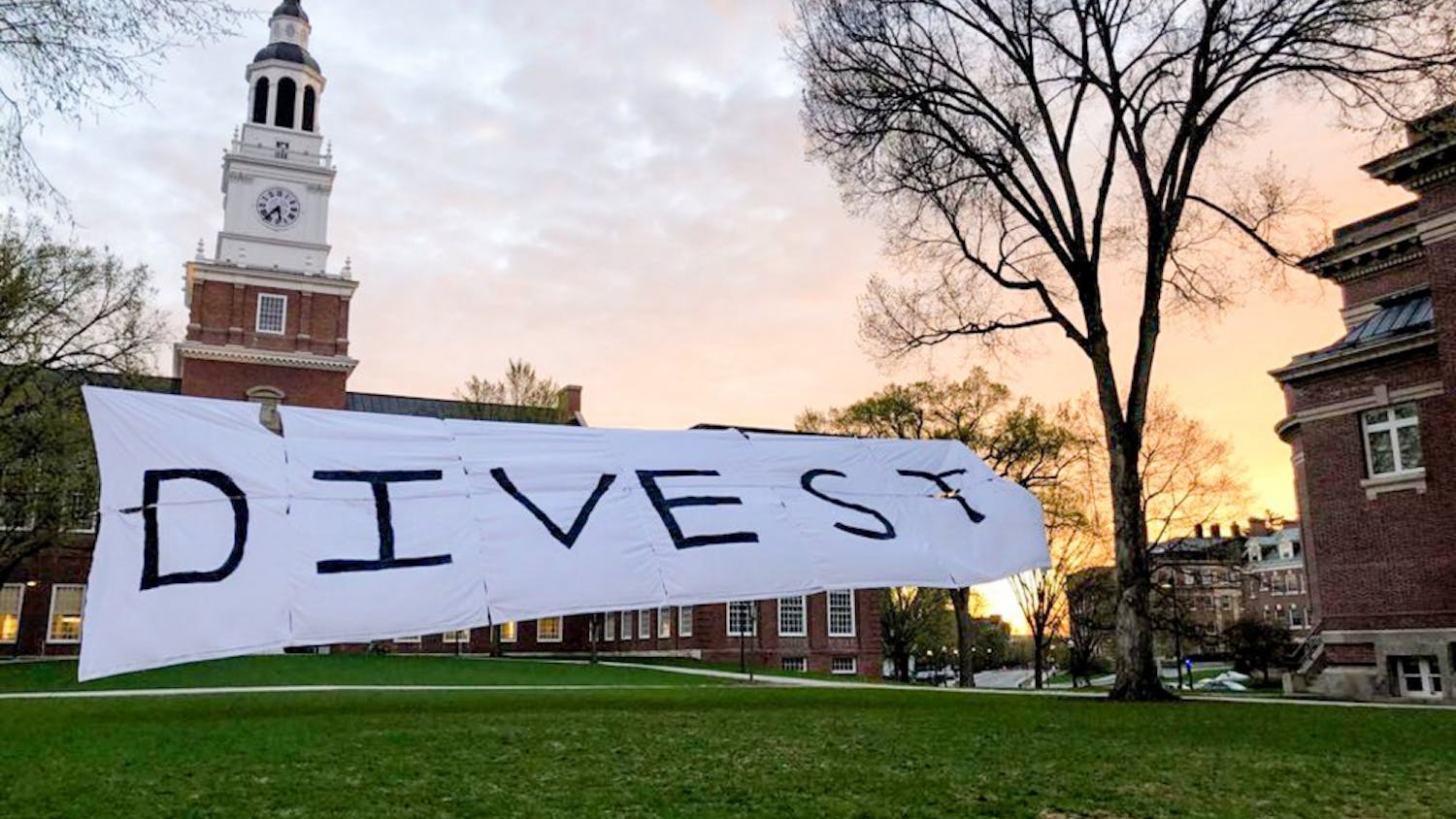“We have the world’s most loyal alumni ... it’s the talent of our alumni body coming back.” As soon as I heard that I knew I had to stand up. Pushing through my racing heartbeat, I got up out of my seat in Spaulding Auditorium, walked towards the stage and began to sing: “People gonna rise like the water, we’re gonna calm this crisis down.”
I interrupted President Phil Hanlon’s June 15 speech at the keynote event of the College’s alumni reunion because I find it profoundly disappointing that while climate change is worsening, unleashing impacts disproportionately on those in the global south, indigenous communities and communities of color, the leadership team at this prestigious institution can spend an hour and a half talking about “Disrupted or Disruptor: How will Dartmouth’s leaders address the most fundamental global challenges of our time?” and not once mention climate change.
I believe that it is the responsibility of Dartmouth’s loyal alumni to call on the College to stand on the right side of history. Six years after I helped start a campaign for Dartmouth to divest its endowment from fossil fuels, our alma mater still chooses to invest part of its $5.5 billion endowment in the fossil fuel industry. The College has yet to take a public stance on this issue, despite its own internal study identifying some form of fossil fuel divestment as the most desirable option, even when prioritizing financial return over ethical, symbolic or academic considerations. An institution of Dartmouth’s renown choosing to divest would have immense symbolic importance and is a key part of revoking the “social license” — the general social acceptability — of the fossil fuel industry.
In the six years that have passed since the campaign for fossil fuel divestment began at Dartmouth, Houston, TX was flooded by Hurricane Harvey, Hurricane Maria battered Puerto Rico, Paradise, CA burned, North Dakota faced water and soil contamination from fracking and Chennai, India almost ran out of water. Decentralized renewable energy has rapidly become a more cost-effective and reliable way to bring electricity, with little pollution, to the world’s population. None of that has prevented the fossil fuel industry from continuing to obscure science, influence our politics, manipulate the public and explore new lands and waters for fossil fuels. Divestment is Dartmouth’s chance to make a moral statement about not being willing to profit from the fossil fuel industry’s abuse of human rights, the environment and our political system.
Divesting on purely ethical grounds would not be unprecedented for the College. Dartmouth chose to divest from South Africa under apartheid after years of sustained pressure from students and alumni. The Board of Trustees at the time said that the investments have “great symbolic meaning.” Dartmouth made the same statement again in 2005, divesting from companies operating in Sudan because “their activities amounted to direct complicity in the genocidal activities of the government of Sudan.” Yet again, in 2012, the Trustees voted to divest from tobacco, seeing that investing in this industry ran counter to the College’s focus on public health. If Dartmouth takes climate change as seriously as it takes these issues, it should divest from fossil fuels.
Aside from the moral argument, divestment is also a strategic financial move. Fossil fuel assets that make up these corporations’ balance sheets are often overvalued in the face of unpredictable shocks, regulatory impacts and advances in renewable technology. We as a society face a stark choice — leave fossil fuel assets in the ground now and rapidly transition the energy sector to renewables, or face even heavier economic consequences in the future. By divesting from fossil fuels now, Dartmouth can minimize risk by shifting the endowment to companies with more long-term viability than the fossil fuel industry. Additionally, had Dartmouth chosen to divest six years ago when this campaign began, the endowment would likely have seen equal or increased growth. Analysis conducted by investment research firm MSCI for the period 2013 to 2019 found that investors who discarded holdings in fossil fuel companies would have outperformed those who remained invested in coal, oil and gas during that same period. Divestment from fossil fuels will not come at a substantial financial cost, and it does not need to pose any risk to financial aid, campus operations or the breadth and depth of Dartmouth’s scholarship.
Meanwhile, $8.77 trillion in assets have been divested from the fossil fuel industry by thousands of institutions and individuals. New York City has made the choice to divest. So has the Church of England, Middlebury College and the Norwegian Sovereign Wealth Fund. So have I and my family — my father, John Curtis ’81, sold stock in Exxon that my grandfather had owned since the 1940s. The smart money is moving now, and Dartmouth still has an opportunity to lead by becoming the first Ivy League school to commit to full divestment.
In the 36 hours following my disruption of President Hanlon’s speech, more than 150 alumni signed onto a rapid response letter calling on the president and trustees to take action on divestment. Since I graduated in 2014, I have heard from more than 1,200 alumni about their support for this campaign. And that support makes a difference. So let us stand with those most impacted by the climate crisis around the world, as sister stands by brother, and divest from the fossil fuel industry now. Science, economics and justice demand it of us.
Morgan Curtis is a member of the Class of 2014, founder of Dartmouth Alumni for Climate Action and a former student leader of Divest Dartmouth.
The Dartmouth welcomes guest columns. We request that guest columns be the original work of the submitter. Submissions may be sent to both opinion@thedartmouth.com and editor@thedartmouth.com. Submissions will receive a response within three business days.


